- Home
- J. T. Edson
Young Ole Devil
Young Ole Devil Read online
‘He’s reckless, irresponsible and can’t - or won’t - avoid getting involved in fights no matter what duty he’s supposed to be carrying out!’
That was the sort of comment which the senior officer of the Texas Light Cavalry might, with some justification, have made about the hot-headed Lieutenant Red Blaze during the War between the States. However, it was uttered by Colonel William Barrett Travis shortly before his departure to take command of the garrison at the Alamo Mission in San Antonio de Bexar early in 1836.
He was speaking about a young officer to whom Major General Sam Houston intended to entrust a dangerous mission. The officer in question was to become famous as the iron-hard disciplinarian who commanded the Confederate States Army of Arkansas and Northern Texas. His name was Jackson Baines Hardin - the man who became known as the ‘lil ole devil’ for fighting...
YOUNG OLE DEVIL
OLE DEVIL HARDIN 1:
By J. T. Edson
First published by Transworld Publishers in 1976
Copyright © 1976, 2015 by J. T. Edson
First Smashwords Edition: April 2015
Names, characters and incidents in this book are fictional, and any resemblance to actual events, locales, organizations, or persons living or dead is purely coincidental.
All rights reserved. No part of this book may be reproduced or transmitted in any form or by any means, electronic or mechanical, including photocopying, recording or by any information or storage and retrieval system, without the written permission of the author, except where permitted by law.
Cover image © 2015 by Edward Martin
This is a Piccadilly Publishing Book
Series Editor: Ben Bridges ~ Text © Piccadilly Publishing
Published by Arrangement with the Author’s Estate.
For the two beautiful Barbaras (French and Innes, in alphabetical order) of the White Lion Hotel, Melton Mowbray, although this probably won’t induce them to serve me an extra pint of lager-and-lime after closing time.
Young Ole Devil
This to explain briefly how the events recorded in YOUNG OLE DEVIL were caused and came about
Early in February 1836 a Mexican army was marching northwards, its numbers increasing as the Militia of various States and other volunteer regiments were called into service by Presidente Antonio Lopez de Santa Anna. Having consolidated his position as absolute dictatorial ruler of all Mexico south of the Rio Bravo, i el Presidente was intending to crush the opposition to his control of Texas.
Neither the Spanish Constitution nor the various regimes which had supplanted it after the formation of the Republic of Mexico in 1822 had ever made a serious effort towards opening up, developing, or even utilizing to any great extent, the vast area of land which they had named ‘Texas’ after the Tejas Indians who had occupied a portion of it. Instead, it had fallen upon foreigners to do so.
Having received a land grant on the Brazos River in 1821, Stephen F. Austin had been encouraged to form a swiftly growing Anglo-U.S. community. Other grants—such as that acquired by the Hardin, Fog and Blaze clan on the Rio Hondo—had been made by the Spanish and earlier Mexican regimes and had allowed the Texians ii to extend their holdings. By 1830, there were close to fifteen thousand of them living in the hitherto unoccupied and unproductive territory.
Such immigrants had proved to be beneficial to their adopted country. Hard working and industrious for the most part, they had been willing to improve and develop the land which they were occupying. Being capable fighting men, skilled in the use of weapons, they had been able to stand up against the hostile bands of Comanche, Wichita, Tonkawa and Kiowa Indians and, unlike many of the Chicano iii population, did not expect, or require the protection of the Mexican army against such foes. Furthermore, as they had increased the potential value of their properties, they had formed a useful source of revenue of the Mexican economy.
However, despite all of the financial and other benefits which had accrued from the Anglo-U.S. colonists, the authorities in Mexico City had grown less and less enamored by the prospect of an ever-increasing foreign population, even when it was occupying and making productive land for which they had little use themselves. Diverse languages, customs and, in some cases, religious beliefs had combined with basic differences between the Texians’ and the Mexicans’ conceptions of democratic government to form constant sources of friction.
The incessant political upheavals, as one unstable regime after another gained power, caused a growing sense of discontent among the Texians. Each successive party to form a government had appeared to be worse than its predecessors. Fully occupied with trying to remain in office, none had given any consideration to the immigrants’ request that Texas be established as a separate State—it was regarded as a territory of the State of Coahuila—with representation in the government. They had, nevertheless, continued to levy taxes and duties against the Texians and had attempted to deny entry to further immigrants. As the Texians who had already become established, and not a few of the Chicanos had pointed out, such a prohibition would ruin all hope of further expansion and development.
While the majority of the Texians had accepted Mexican citizenship in good faith, the refusal to grant representation, and other treatment to which they had been subjected by the various regimes caused them to revise their attitudes. More and more of them had come to agree with the faction, amongst which Samuel Houston had been prominent, which had insisted that the only secure future for themselves and their descendants lay in the annexation of Texas by the United States of America.
On coming into power, Santa Anna had quickly shown signs of being more ruthless, vindictive and oppressive than any of his predecessors. Adopting the invariable tactics of every dictator or despotic regime who seeks to impose his, or its, will upon a population, he had decreed that the ownership of firearms was illegal and had sent an order to his brother-in-law, General Martin Perfecto de Cos, that all the Texians were to be disarmed.
Santa Anna’s edict regarding firearms proved to be the final straw which had broken the colonists’ patience. The Texians had realized that to surrender their weapons would leave them defenseless against the hostile Indians and criminal elements, none of whom would have given up their arms. What was more, it would effectively prevent the immigrants from resisting further impositions by el Presidente.
When the garrisons of the Mexican army—showing an energy which had been noticeably absent when called upon to deal with Indians or bandidos—attempted to carry out the disarmament, the Texians had refused to obey. There had been rioting and open conflict at Anahuac, Gonzales, Velasco and other places. Such had been the fury of the Texians’ resistance that most of the Mexican troops had been compelled to fall back and join General Cos at San Antonio de Bexar. Faced with what amounted to an open rebellion by men who still possessed the means to resist and were generally superior to his own soldiers in the handling of weapons, Cos had not been able to enforce el Presidente’s wishes. Nor, despite having been aware of the gravity of the situation, had he attempted to have the disarmament edict rescinded or tried to bring about a peaceful settlement.
Realizing that there was no hope of obtaining an. amicable and satisfactory relationship with Santa Anna, the Texians had decided to sever all connections with Mexico. They had set up a provisional government, with Henry Smith and James W. Robinson as Governor and Lieutenant Governor respectively and had sent a commission headed by Stephen F. Austin to the United States to try to obtain arms and provisions. Samuel Houston had been appointed major general and made responsible for organizing an army to defend what would—at least until annexation by the United States, which everybody was confident would be a foregone conclusion, be an independent republic under the Lone Star flag. Promin
ent and wealthy Texians, such as James Bowie, William Barrett Travis, Edward Burleson, Benjamin Milam, the Fog brothers, Edward and Marsden, James W. Fannin and Frank Johnson, had raised regiments—few of which had a strength exceeding two hundred men—so as to be ready to meet the attempts which all knew Santa Anna would make to subdue their bid for independence.
The earlier stages of the rebellion had been successful as far as the Texians were concerned. Several minor skirmishes had gone in their favor, as had the only major confrontation to have taken place. On December the nth, 1835, after a battle which had lasted for six days, Cos and his force of eleven hundred men had surrendered to Colonels Milam and Burleson at San Antonio de Bexar. Although there had been objections from some of the other senior officers in the Republic of Texas’s army, the co-commanders had allowed all of their captives to return unharmed to Mexico on Cos having given his parole that he and his men would not participate in further military action against the Texians. If the reports which had been brought in by the Texians’ scouts had been correct, the protest of some officers had been justifiable. Cos was accompanying his brother-in-law and clearly did not intend to honor the conditions of his parole.
While the various successes had boosted the morale of the Republic of Texas’s army, they had proved a mixed blessing in that they presented an incorrect impression of the struggle which still lay ahead. The victories, as Houston and most of his senior officers appreciated, had been achieved against poorly trained, badly equipped, and indifferently commanded troops.
Due to Texas being so far from the centre of their country’s affairs and offering few opportunities for gaining distinction and promotion, career-conscious officers of good quality had avoided serving there. Houston knew that such men would now be coming and would command battle-tried battalions which had fought in the various struggles between the factions who were attempting to take over the reins of government. They would be a much more dangerous proposition than anything so far faced by the Texians. Not only that, the Mexicans would have a tremendous advantage in numbers.
Being aware of the disparity of the size of his own command and the army which Santa Anna would be able to put into the field, Houston had been disinclined to meet the Mexicans in open battle except upon his own terms and on ground of his choosing. With that in mind, he had ordered all the scattered regiments and people in the western sector to assemble at San Antonio de Bexar. Once they had done so, it was his intention to withdraw into East Texas and make their stand where, if things should go against them, they would have an avenue of escape by crossing the border into the United States.
Although many of the Texians who would be compelled to abandon their homes had seen the wisdom of withdrawing, realizing that el Presidente would show them no mercy if he laid hands on them, not all had done so. Four hundred men, under the command of Colonel Fannin, had declared that they would not retreat and intended to hold the town of Goliad.
There was, however, another and more serious threat to the unity of what remained of Houston’s army. Eager for fame, acclaim and glory, Colonel Frank Johnson was planning to invade Mexico along the Gulf Coast route and was willing to go to any lengths to make his scheme succeed.
Chapter One – I’m Fighting for the Likes of Them!
‘I don’t doubt Sam Houston’s courage, or his integrity,’ Stanforth Duke stated, after one of the men who had accompanied him to San Antonio and was mingling with the other customers, acting as a stranger, had asked for his views on the current situation. Since entering the Little Sisters Cantina, he had spent much money buying drinks and had made himself so popular that he felt sure that the crowd would be willing to listen to him. Knowing that there would be some present who held the Commanding General of the Republic of Texas’s army in high esteem, he did not want to antagonize them by too blatant a criticism of their hero. ‘But I do question his judgment when he talks of burning homes and crops, iv then running away from the Mexicans. Don’t get me wrong, though, I’ve no stake in this personally. I live up north near Shelbyville. But if my home was down in this part of the country, I’d be damned if I’d be willing to put a torch to it, up stakes and run. Especially as we’ve licked the greasers every time we’ve locked horns with ’em.’
‘It ain’t right for you to be talking that ways, stranger,’ protested a second member of Duke’s party, who was sitting at a table some distance away from the first man. ‘You know the General figures that’s the right thing to do.’
‘With respect sir, I don’t agree that I shouldn’t be saying Sam Houston’s wrong in how he wants to handle things,’ Duke answered. The interruption had been made to anticipate any similar protest from genuine supporters of the General. ‘The way I figure it, the Republic of Texas’s a free country where a man’s entitled to speak his mind about anything, or anybody, no matter how important they be. That’s one of the reasons we’ve taken up arms against Santa Anna.’
Having delivered the comment, the burly, well-dressed man paused so as to study the response to it. Clearly nobody suspected that he and the lanky, buckskin-clad protestor were working together. There was a brief, yet general rumble of agreement. Satisfied that he had made his point and would be allowed to continue without interruption, he swept his gaze around the crowded barroom.
The customers who had assembled at the Little Sisters Cantina shortly after noon on February 18, 1836, were a cross-section of the male Texian population who had gathered at San Antonio in answer to Houston’s summons. Some of them had on homespun garments of the style common among the poorer communities of the United States. There were others clad in buckskins, after the fashion of the mountain men. Several wore clothing derived from the working attire of the Mexican vaqueros which was in the process of evolving into the traditional dress of the Texas cowhands. A few, such as Duke, sported broadcloth or cheaper styles of town suits. Scattered among them were a number of soldiers whose fatigue uniforms—black leather, kepi-like forage caps which could be folded flat for packing; waist-length dark blue tunics that had high, stiff stand-up collars but lacked the pipe-clayed white cross belts; lighter blue trousers decorated by stripes along the outer seams of the legs; black boots with spurs on the heels—had been copied, with minor variations, from the United States’ Regiment of Dragoons by Colonel William Barrett Travis and supplied to the members of his command.
Although only Travis’s men wore recognizable uniforms, Duke knew that there were representatives of every regiment in the vicinity present. So he had an audience which was ideally suited for his purposes. He had come to San Antonio with the dual purpose of recruiting men for the force with which Colonel Frank Johnson was planning to invade Mexico, and to persuade those who remained to compel Houston to make a stand instead of withdrawing. If the latter could be achieved, the attention of the whole of the Mexican army would be directed against Houston and it would greatly increase Johnson’s chances of success. Neither Johnson nor Duke were over concerned with the adverse effect such a stand might, probably would, have upon the General’s outnumbered force.
‘What’d you-all reckon we should do, mister?’ asked a stocky man in a cheap town suit, from another part of the room.
‘Attack the greasers before they can even cross the Rio Grande,’ Duke replied, accepting the cue which had been fed by the third of his associates. ‘That way, there’ll be no call for you to leave the homes you’ve worked so hard to build. You’ll stop the greasers before they can get near to them.’
‘By cracky, that’s right!’ enthused the stocky man and there was another mutter of fairly general approval.
Standing behind the bar, William Cord listened to the conversation with considerable misgivings as he guessed what it was leading up to. It was probably the last opportunity that Cord would have to do business for some time and he had benefited by the amount of money which Duke had spent. For all that, he wished the burly man had stayed away from his cantina. Being whole-heartedly in favor of Houston’s strategy, even though
following it would mean that he must abandon his hitherto lucrative place of business, he did not approve of what he guessed was a carefully organized attempt to change it.
However, after the clever way in which Duke had established his right to freedom of expression, Cord could not see any way of preventing him from airing his views. For the cantina’s owner—a known supporter of Houston’s policies—to attempt any kind of intervention would, he realized, evoke protests which might erupt into open conflict between those who were in favor of the General’s strategy and those who opposed it. Cord suspected that the men who had supplied the various comments were in cahoots with Duke. He had a good idea that there were at least two more of the agitator’s companions in the room, although as yet they had not spoken. Big, burly, unshaven, dressed in poor quality town suits with grubby, collarless white shirts, they had a strong family resemblance which suggested they might be brothers. Like the other customers who were lining the bar almost elbow-to-elbow, they were standing with their backs to Cord. However, instead of looking at Duke, they were watching the crowd,
Turning his gaze in the pair’s direction, Cord noticed a man coming through the batwing doors. Approaching the counter, the newcomer moved with a Gascon swagger which reminded the owner of the arrogant, over-proud, French-Creole dandies he had seen in New Orleans. Although he was not French, the man exuded a similar cocky self-importance and—assurance. His clothing was clean and he had a well-scrubbed look.
Bareheaded, with his wide-brimmed, low-crowned black hat dangling by its fancy barbiquejo chinstrap on to his back, the young man—he would be in his mid-twenties—was six foot in height and had a straight-backed, whipcord lean frame which was set off to its best advantage by his well-tailored garments. He had a thinly-rolled silk bandana which was a glorious riot of brilliant, if clashing, colors knotted about his throat so that its long ends trailed over the breast of his open-necked fringed buckskin shirt. His tight-fitting fawn riding breeches ended in the tops of highly polished Hessian boots. The belt into which he had hooked his thumbs carried a long-bladed, clip-pointed knife—of the type made by James Black, the Arkansas master-cutler, which had already become known as a ‘bowie’, in honor of the man who had designed the original—in a decorative Indian sheath at the left side. There was a slanting, two-inch broad leather loop attached to the right side of the belt. Into this was thrust the barrel of a good quality pistol so that the butt was pointing forward and would be available to the grasp of either hand.

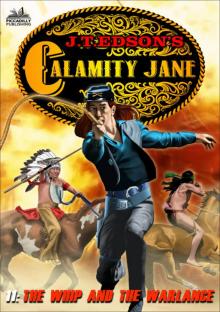 Calamity Jane 11
Calamity Jane 11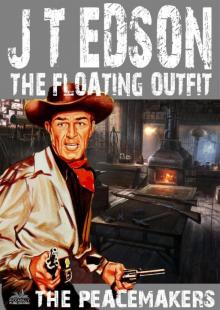 The Floating Outift 33
The Floating Outift 33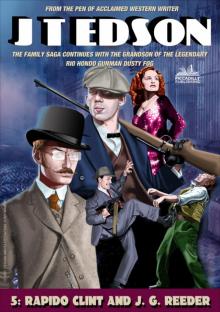 Cap Fog 5
Cap Fog 5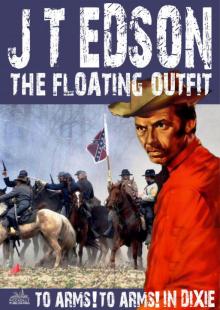 The Floating Outfit 34
The Floating Outfit 34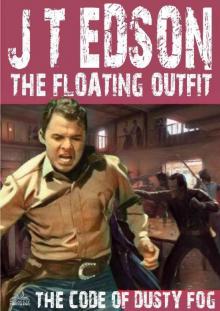 The Code of Dusty Fog
The Code of Dusty Fog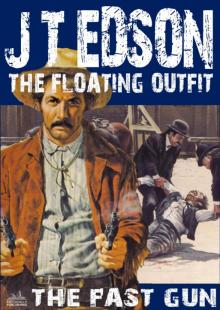 The Floating Outfit 21
The Floating Outfit 21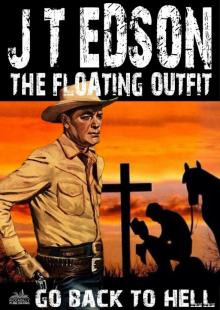 The Floating Outift 36
The Floating Outift 36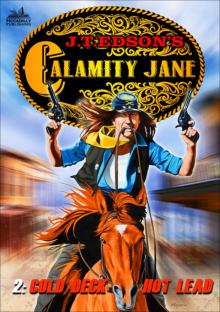 Calamity Jane 2
Calamity Jane 2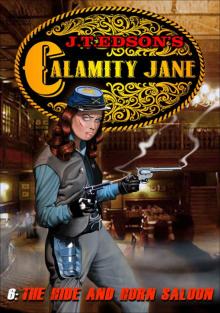 Calamity Jane 6: The Hide and Horn Saloon (A Calamity Jane Western)
Calamity Jane 6: The Hide and Horn Saloon (A Calamity Jane Western)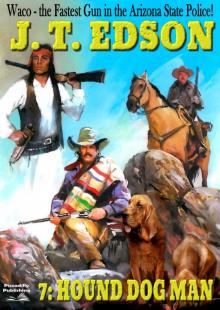 Waco 7
Waco 7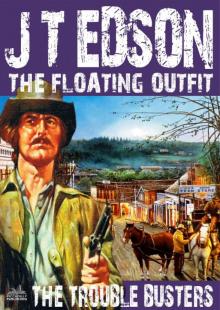 The Floating Outfit 25
The Floating Outfit 25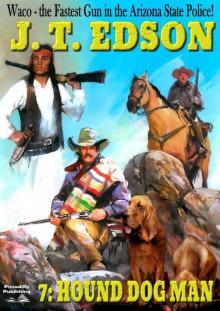 Waco 7: Hound Dog Man (A Waco Western)
Waco 7: Hound Dog Man (A Waco Western)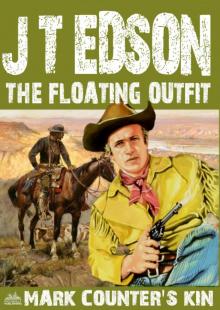 The Floating Outfit 47
The Floating Outfit 47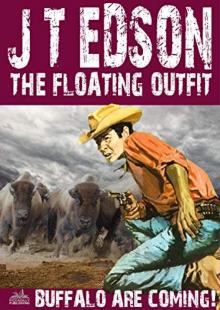 The Floating Outfit 42: Buffalo Are Coming!
The Floating Outfit 42: Buffalo Are Coming!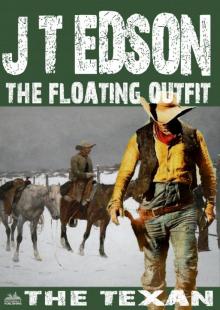 The Floating Outfit 46
The Floating Outfit 46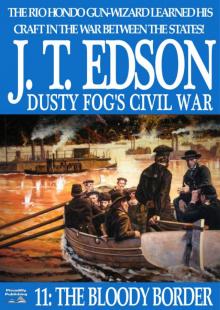 Dusty Fog's Civil War 11
Dusty Fog's Civil War 11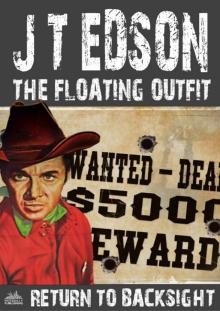 The Floating Outfit 61
The Floating Outfit 61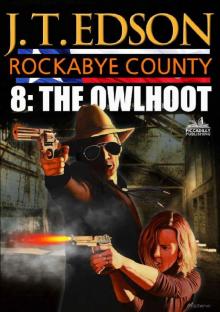 The Owlhoot
The Owlhoot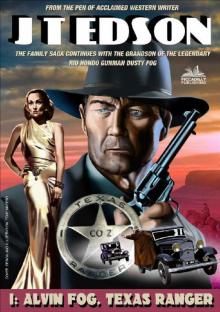 Alvin Fog, Texas Ranger
Alvin Fog, Texas Ranger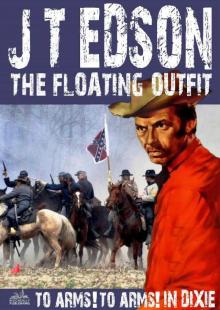 The Floating Outfit 34: To Arms! To Arms! In Dixie! (A Floating Outfit Western)
The Floating Outfit 34: To Arms! To Arms! In Dixie! (A Floating Outfit Western)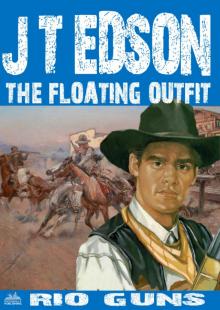 The Floating Outfit 44
The Floating Outfit 44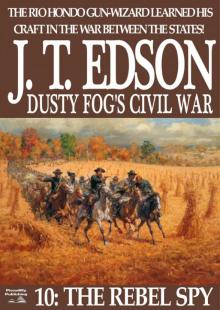 Dusty Fog's Civil War 10
Dusty Fog's Civil War 10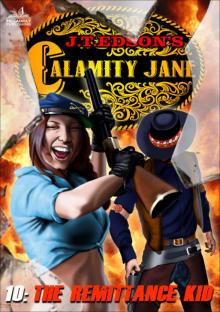 Calamity Jane 10
Calamity Jane 10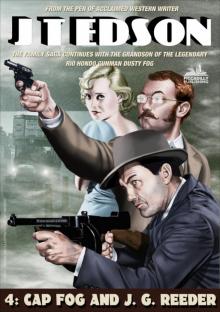 Cap Fog 4
Cap Fog 4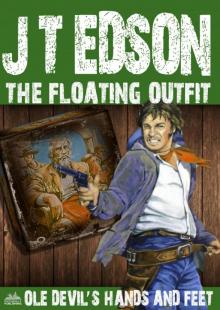 The Floating Outfit 51
The Floating Outfit 51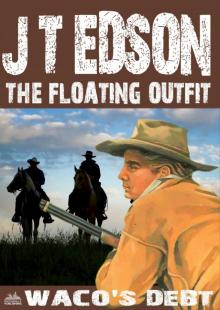 The Floating Outfit 50
The Floating Outfit 50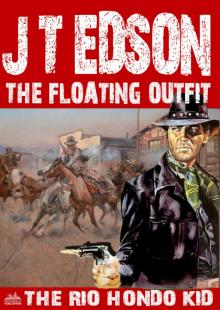 The Floating Outfit 49
The Floating Outfit 49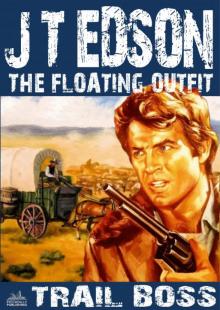 The Floating Outfit 10
The Floating Outfit 10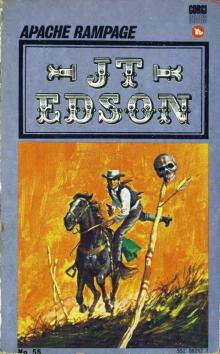 Apache Rampage
Apache Rampage The Floating Outfit 15
The Floating Outfit 15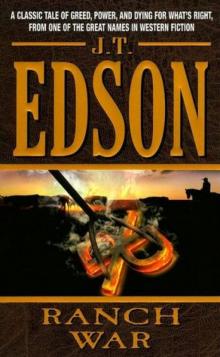 Ranch War
Ranch War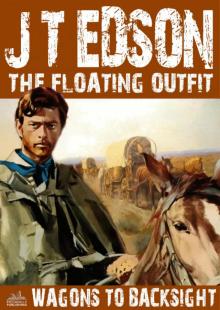 The Floating Outfit 11
The Floating Outfit 11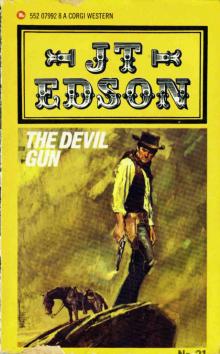 The Devil Gun
The Devil Gun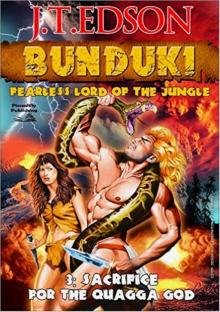 Sacrifice for the Quagga God (A Bunduki Jungle Adventure Book 3)
Sacrifice for the Quagga God (A Bunduki Jungle Adventure Book 3)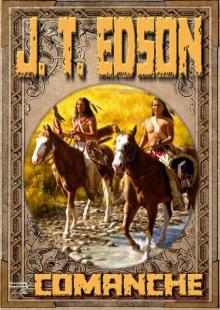 Comanche (A J.T. Edson Western Book 1)
Comanche (A J.T. Edson Western Book 1)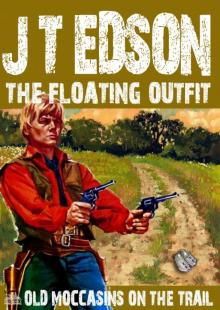 The Floating Outfit 48
The Floating Outfit 48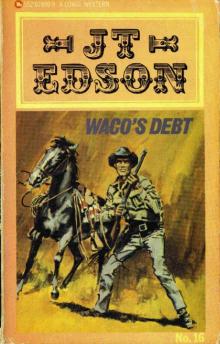 Wacos Debt
Wacos Debt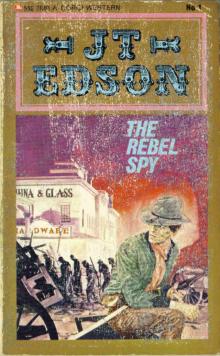 The Rebel Spy
The Rebel Spy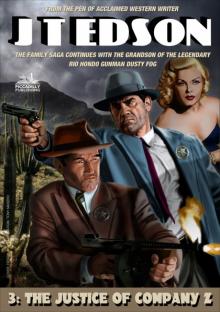 Cap Fog 3
Cap Fog 3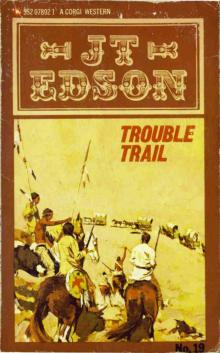 Trouble Trail
Trouble Trail Cold Deck, Hot Lead
Cold Deck, Hot Lead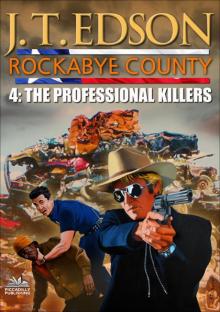 Rockabye County 4
Rockabye County 4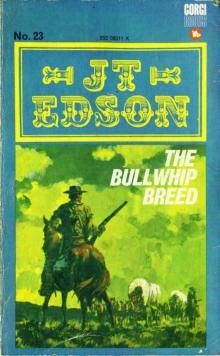 The Bullwhip Breed
The Bullwhip Breed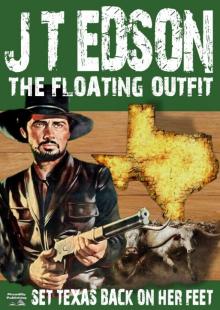 Set Texas Back On Her Feet (A Floating Outfit Western Book 6)
Set Texas Back On Her Feet (A Floating Outfit Western Book 6)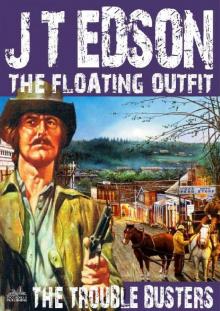 The Floating Outfit 25: The Trouble Busters (A Floating Outfit Western)
The Floating Outfit 25: The Trouble Busters (A Floating Outfit Western)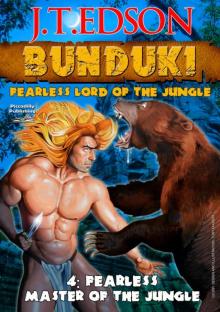 Fearless Master of the Jungle (A Bunduki Jungle Adventure
Fearless Master of the Jungle (A Bunduki Jungle Adventure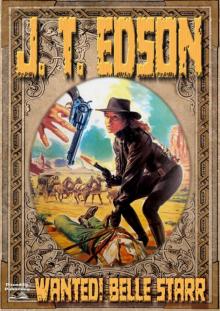 Wanted! Belle Starr!
Wanted! Belle Starr! The Big Hunt
The Big Hunt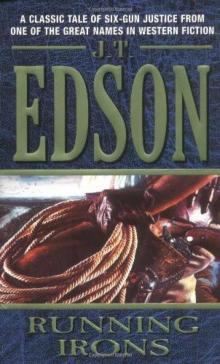 Running Irons
Running Irons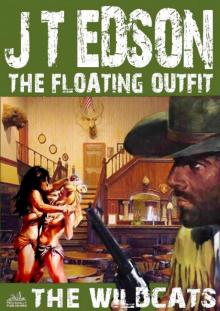 The Floating Outfit 19
The Floating Outfit 19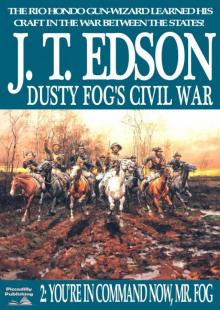 You're in Command Now, Mr Fog
You're in Command Now, Mr Fog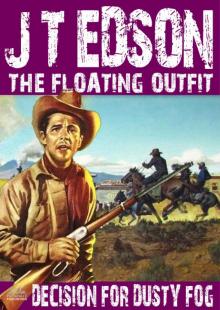 The Floating Outfit 27
The Floating Outfit 27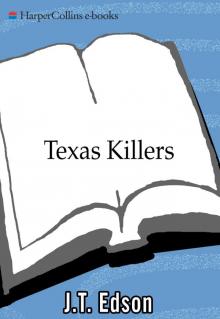 Texas Killers
Texas Killers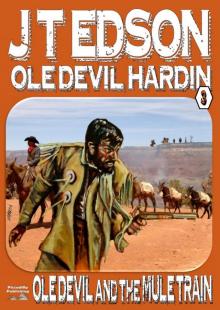 Ole Devil and the Mule Train (An Ole Devil Western Book 3)
Ole Devil and the Mule Train (An Ole Devil Western Book 3)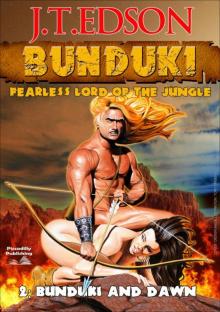 Bunduki and Dawn (A Bunduki Jungle Adventure Book 2)
Bunduki and Dawn (A Bunduki Jungle Adventure Book 2)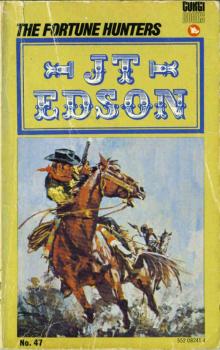 The Fortune Hunters
The Fortune Hunters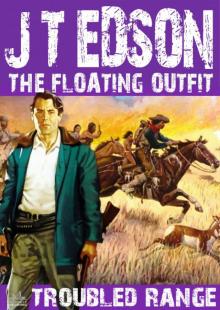 The Floating Outfit 12
The Floating Outfit 12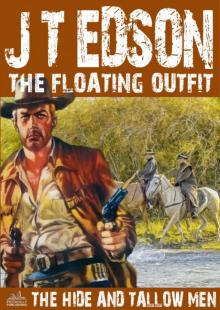 The Hide and Tallow Men (A Floating Outfit Western. Book 7)
The Hide and Tallow Men (A Floating Outfit Western. Book 7)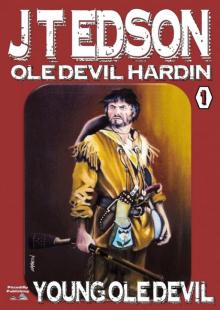 Young Ole Devil
Young Ole Devil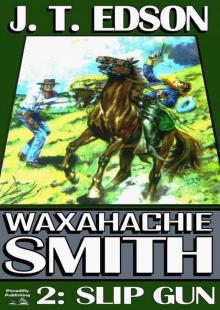 Slip Gun
Slip Gun The Drifter
The Drifter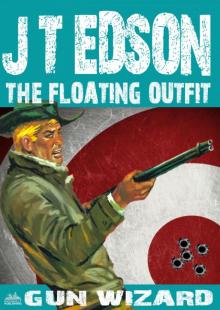 The Floating Outfit 45
The Floating Outfit 45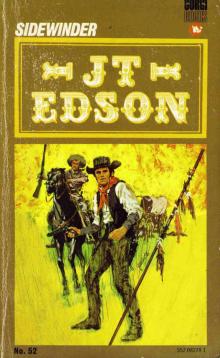 Sidewinder
Sidewinder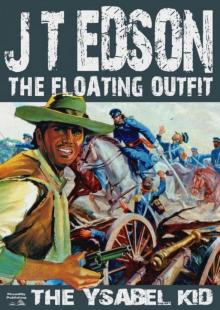 The Ysabel Kid
The Ysabel Kid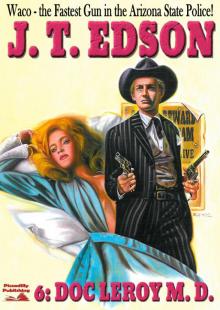 Waco 6
Waco 6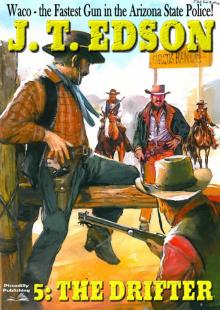 Waco 5
Waco 5 Point of Contact
Point of Contact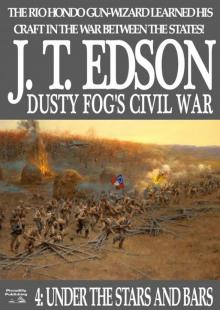 Under the Stars and Bars (A Dusty Fog Civil War Western Book 4)
Under the Stars and Bars (A Dusty Fog Civil War Western Book 4)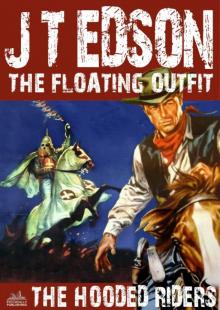 The Floating Outfit 9
The Floating Outfit 9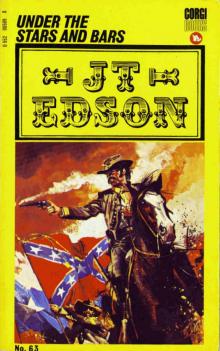 Under the Stars and Bars
Under the Stars and Bars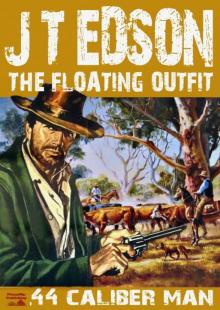 .44 Caliber Man
.44 Caliber Man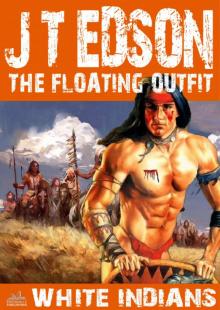 The Floating Outfit 17
The Floating Outfit 17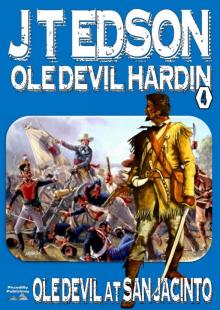 Ole Devil at San Jacinto (Old Devil Hardin Western Book 4)
Ole Devil at San Jacinto (Old Devil Hardin Western Book 4)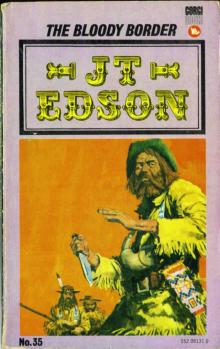 The Bloody Border
The Bloody Border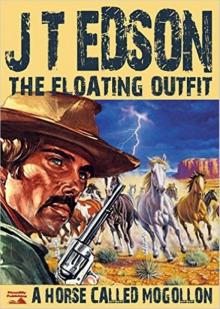 A Horse Called Mogollon (Floating Outfit Book 3)
A Horse Called Mogollon (Floating Outfit Book 3)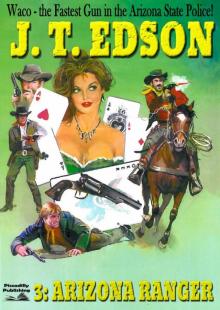 Waco 3
Waco 3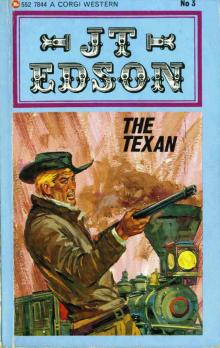 The Texan
The Texan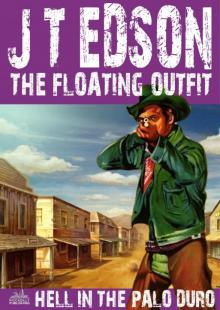 The Floating Outfit 35
The Floating Outfit 35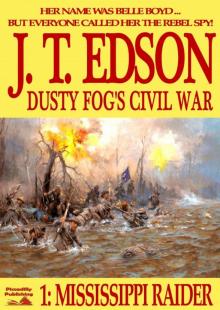 Mississippi Raider
Mississippi Raider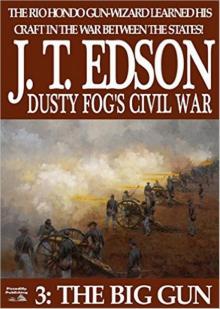 The Big Gun (Dusty Fog's Civil War Book 3)
The Big Gun (Dusty Fog's Civil War Book 3)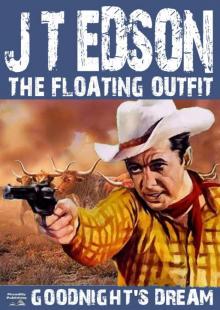 Goodnight's Dream (A Floating Outfit Western Book 4)
Goodnight's Dream (A Floating Outfit Western Book 4) Waco 4
Waco 4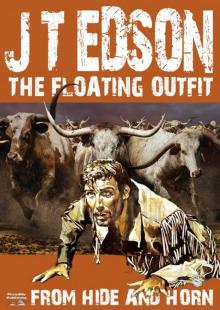 From Hide and Horn (A Floating Outfit Book Number 5)
From Hide and Horn (A Floating Outfit Book Number 5)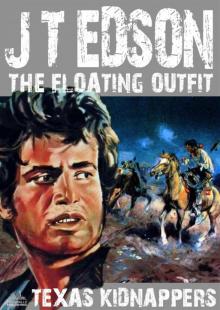 The Floating Outfit 18
The Floating Outfit 18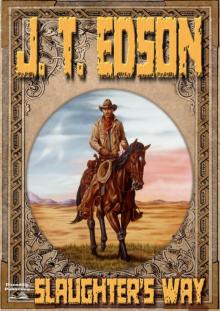 Slaughter's Way (A J.T. Edson Western)
Slaughter's Way (A J.T. Edson Western)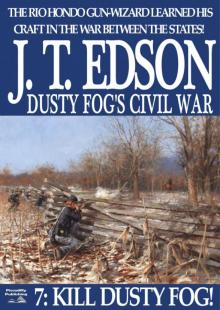 Dusty Fog's Civil War 7
Dusty Fog's Civil War 7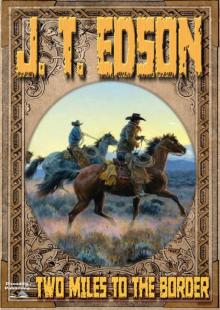 Two Miles to the Border (A J.T. Edson Western)
Two Miles to the Border (A J.T. Edson Western)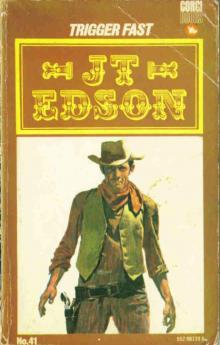 Trigger Fast
Trigger Fast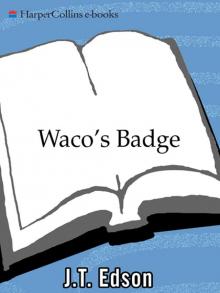 Waco's Badge
Waco's Badge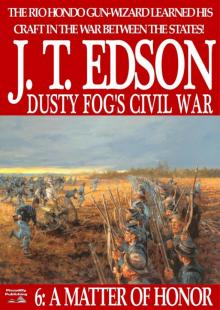 A Matter of Honor (Dusty Fog Civil War Book 6)
A Matter of Honor (Dusty Fog Civil War Book 6)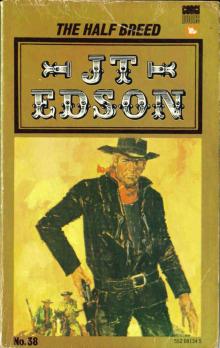 The Half Breed
The Half Breed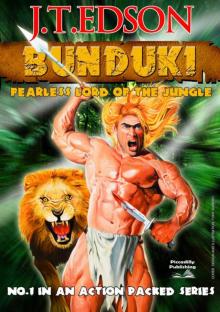 Bunduki (Bunduki Series Book One)
Bunduki (Bunduki Series Book One)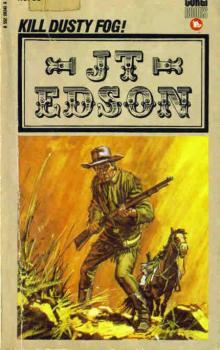 Kill Dusty Fog
Kill Dusty Fog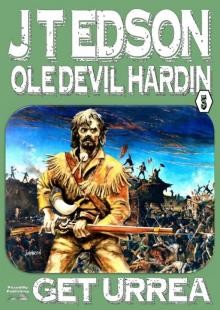 Get Urrea! (An Ole Devil Hardin Western Book 5)
Get Urrea! (An Ole Devil Hardin Western Book 5)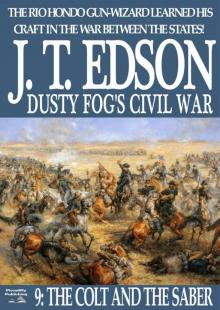 Dusty Fog's Civil War 9
Dusty Fog's Civil War 9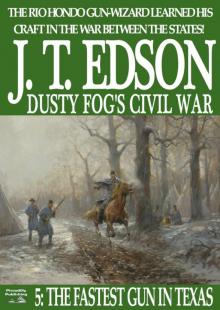 The Fastest Gun in Texas (A Dusty Fog Civil War Book 5)
The Fastest Gun in Texas (A Dusty Fog Civil War Book 5)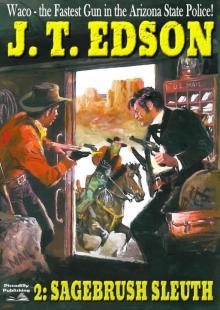 Sagebrush Sleuth (A Waco Western #2)
Sagebrush Sleuth (A Waco Western #2)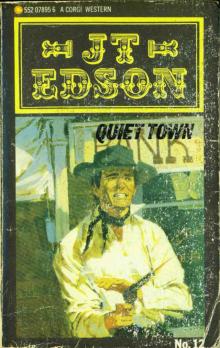 Quiet Town
Quiet Town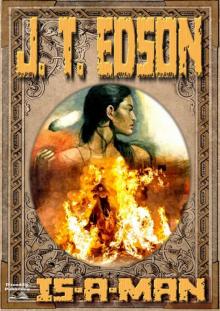 Is-A-Man (A J.T. Edson Standalone Western)
Is-A-Man (A J.T. Edson Standalone Western)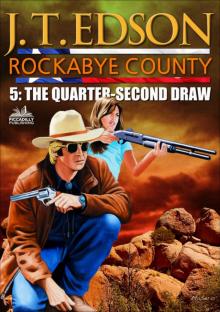 Rockabye County 5
Rockabye County 5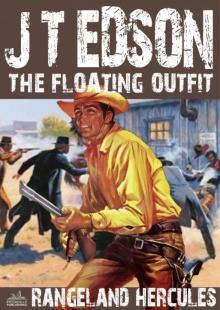 The Floating Outfit 14
The Floating Outfit 14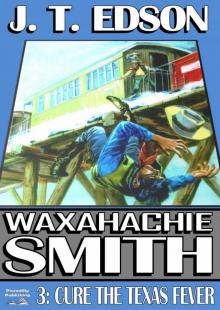 Cure the Texas Fever (A Waxahachie Smith Western--Book 3)
Cure the Texas Fever (A Waxahachie Smith Western--Book 3)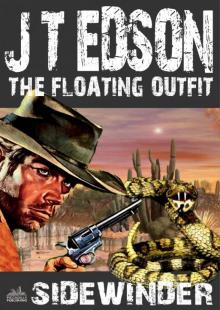 The Floating Outfit 13
The Floating Outfit 13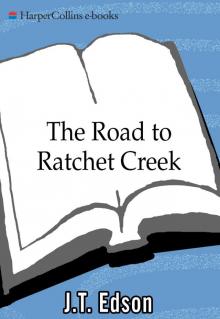 The Road to Ratchet Creek
The Road to Ratchet Creek